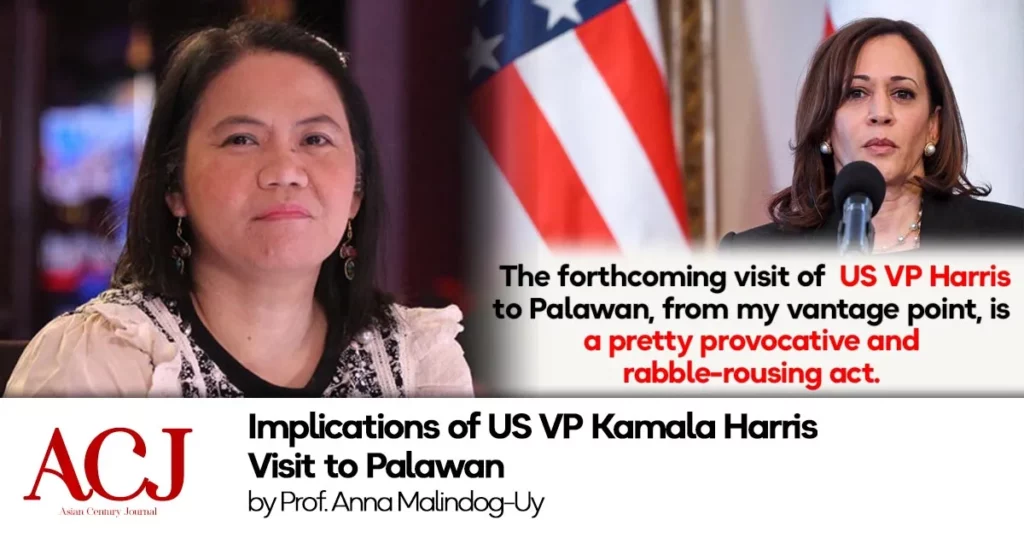
The United States (US) Vice President Kamala Harris is scheduled to visit the Philippines from 20 November (Sunday) to November 22 (Tuesday), 2022. Thus far, Harris will be the highest-ranking US official of the Biden administration to pay a visit to the Philippines.
I guess such a visit from the second highest ranking official of the US is quite an average, typical, and conventional occasion between the Philippines and the US, given the good and friendly relations between the two countries.
A state visit of a high-ranking official of one country to another is thus far considered the highest level of international affirmation of good relations between two countries. Usually, its purpose is to confirm the good relationship between the countries concerned.
Nevertheless, what’s odd and not so conventional in the upcoming visit of Harris to the Philippines is her impending visit to a facility being established under the U.S.-Philippines Enhanced Defense Cooperation Agreement (EDCA) at Antonio Bautista Air Base in Puerto Princesa, Palawan, which is the home of the Philippines military command in charge of defending and patrolling the Spratly Islands and where one of the EDCA or US military bases is located.
Just like any concerned Filipino who cares a lot about their country’s relations with the United States and China, given that both countries are good friends of the Philippines, the forthcoming visit of US VP Harris to Palawan, from my vantage point, is a pretty provocative and rabble-rousing act. It will again put the Philippines in a precarious and awkward situation vis-à-vis Beijing. This impending visit to Palawan by Harris is a provocative and beguiling act. It is akin to provoking Beijing at the expense of the Philippines.
The way I see it, the fast-approaching visit of Harris to Palawan will create unnecessary and unwarranted tension and controversy between the Philippines and Beijing. It will put the Philippines in a new round of possible unnecessary tensions with China, which is unproductive and could be avoided.
Notably, China is the Philippines’ top trading partner, the top source of imports, the third-largest export destination, and the second-largest source of foreign investments. China is a solid partner of the Philippines on the economic front, and that relationship is vital to the country.
South China Sea
Moreover, to justify the visit of Harris to Palawan as a gesture of Biden’s administration’s show of commitment to stand with the Philippines as a military ally in accordingly upholding rules-based order in the South China Sea (SCS) is somewhat ludicrous and absurd. I guess Filipinos should take such a deduction with a grain of salt. The fact of the matter is the US has interests in the highly controversial disputed SCS because of its pivot to Asia foreign policy.
But come to think of it, the United States is an outsider or an external power vis-à-vis the SCS. It is a country situated on the other side of the Pacific. It is not a party to the SCS dispute. It does not own an inch of territory in the South China Sea, nor does it have a legitimate maritime interest in the South China Sea except its claims to “freedom of navigation” and other lawful uses of the South China Sea, including innocent passage based on the United Nations Law of the Sea (UNCLOS). However, “freedom of navigation” in the SCS is an interest shared by all countries in Asia and beyond, including China and the Philippines, and not just by the United States.
I don’t think China is opposed to the freedom of navigation of countries in the SCS, primarily for economic reasons like trade. But I guess what China is ambivalent and anxious about is the US and its Western allies’ “gunboat diplomacy” in the SCS and the possibility that the US will use the SCS to contain and encircle China militarily.
Such a scenario not only threatens China’s national security and existence but from the vantage point of the Chinese, such a situation is akin to an existential threat to China’s existence and survival as a country. This is the crux of the matter when discussing geopolitics and the South China Sea.
Real talk dictates that the Philippines must avoid and prevent at all costs the possibility of becoming a pawn of any superpower to encircle another superpower.
RP-US Military Alliance
On another note, it is evident that the main pillars of the U.S.-RP bilateral relationship are: first and foremost, the two countries’ security alliance, the Philippines being a treaty ally of the US under the Mutual Defense Treaty (MDT), and the fact that the Philippines, for the longest time, relied heavily on the US for its external security and funding the modernization of the Armed Forces of the Philippines.
Now, suppose the upcoming visit of Harris is somewhat analogous to a show of affirmation on the side of the US of the military alliance between the two countries. In a way, in that case, this is, to a greater extent, understandable.
But if fortifying the military alliance between the Philippines and the United States means the establishment of an additional five more US military bases, additional military assets, and more US boots on the ground, I don’t think this is the way forward for the Philippines. This is akin to militarizing the Philippines. This will lead to a possibility of war between superpowers at the expense of the Philippines.
If things go wrong and a war in the Indo-Pacific region breaks out, the Philippines will end up the collateral damage. I don’t think being a pawn or proxy of the US in its geopolitical contests with China is part of the supreme national interests of the Philippines. I don’t think so.
What the Philippines needs at this time is not an additional five EDCA (US) military bases but the establishment of more economic and industrial zones and parks that China can and is willing to help the country with. Now, if the US wants to chime in to aid the country economically, why not? It can freely do so rather than trying to persuade the current Philippine government to give way to more US military bases.
Conclusion
The way forward for the Philippines is to strengthen its economic and trade ties with China, with the US if possible, and with middle powers like the European Union and its ASEAN neighbors, which will benefit the country and its people tangibly. Geopolitics is costly and detrimental to the well-being of the country and the region.
The Philippines must not take sides and pursue a genuine and meaningful independent foreign policy. It must not choose one over the other. The Philippines must stay its course of being a friend to all and an enemy to none. Our interest as a country is to maximize the benefits of good relations with China and the United States.
Concerning the disputed SCS, I think as long as the maritime relations between the Philippines and China are stable, the overall situation of Philippines-China relations will be stable and secured, and the Philippines-China friendly, cooperative and pragmatic relations will flourish.
Source: Asian Century Journal
https://asiancenturyph.com/2022/11/18/implications-of-us-vp-kamala-harris-visit-to-palawan/


